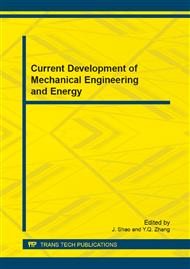[1]
L. Chang and Z. Wu, Performance and reliability of electrical power grids under cascading failures[J]. International Journal of ElectricalPower & Energy Systems. 2011 (33) 1410-1419.
DOI: 10.1016/j.ijepes.2011.06.021
Google Scholar
[2]
J. Wang and L. Rong, Robustness of the western United States power grid under edge attack strategies due to cascading failures[J]. Safety Science. 2011 (49) 807-812.
DOI: 10.1016/j.ssci.2010.10.003
Google Scholar
[3]
Z.J. Bao, Y.J. Cao, G.Z. Wang, and L.J. Ding, Analysis of cascading failure in electric grid based on power flow entropy[J]. Physics Letters A. 2009 (373) 3032-3040.
DOI: 10.1016/j.physleta.2009.06.058
Google Scholar
[4]
L. Dueñas-Osorio and S. M. Vemuru, Cascading failures in complex infrastructure systems[J]. Structure Safety. 2009 (31) 157-167.
DOI: 10.1016/j.strusafe.2008.06.007
Google Scholar
[5]
J. Chen, J. S. Thorp, and I. Dobson, Cascading dynamics and mitigation assessment in power system disturbances via a hidden failure model[J]. International Journal of ElectricalPower & Energy Systems. 2005 (27) 318-326.
DOI: 10.1016/j.ijepes.2004.12.003
Google Scholar
[6]
H. Song and M. Kezunovic, A new analysis method for early detection and prevention of cascading events[J]. Electric Power Systems Research. 2007 (77) 1132-1142.
DOI: 10.1016/j.epsr.2006.09.010
Google Scholar
[7]
A. H. Gharehgozli, R. Tavakkoli-Moghaddam, and N. Zaerpour, A fuzzy-mixed-integer goal programming model for a parallel-machine scheduling problem with sequence-dependent setup times and release dates[J]. Robotics and Computer-integrated Manufacturing, 2009 (25) 853-859.
DOI: 10.1016/j.rcim.2008.12.005
Google Scholar
[8]
K. Chen and C. Chen, Applying multi-agent technique in multi-section flexible power system system[J]. Expert Systems with Applications. 2010 (37) 7310-7318.
DOI: 10.1016/j.eswa.2010.04.024
Google Scholar
[9]
L. Wang and S. Lin, A multi-agent based agile power system planning and control system[J]. Computers in Industry. 2009 (57) 620-640.
DOI: 10.1016/j.cie.2009.05.015
Google Scholar
[10]
M. G. Sahab, A. F. Ashour, and V. V. Toropov, A hybrid genetic algorithm for reinforced concrete flat slab buildings[J]. Automation in Construction, 2005 (83) 551-559.
DOI: 10.1016/j.compstruc.2004.10.013
Google Scholar
[11]
K. Deep, and K. N. Das, Quadratic approximation based hybrid genetic algorithm for function optimization[J]. Applied Mathematics and Computation. 2008 (203) 86-98.
DOI: 10.1016/j.amc.2008.04.021
Google Scholar
[12]
HaIjunkoskjl, Grossmann I E, A decomposition approach for the scheduling of a steel plant production[J]. Computers and Chemical Engineering, 2001 (25) 1647-1660.
DOI: 10.1016/s0098-1354(01)00729-3
Google Scholar


